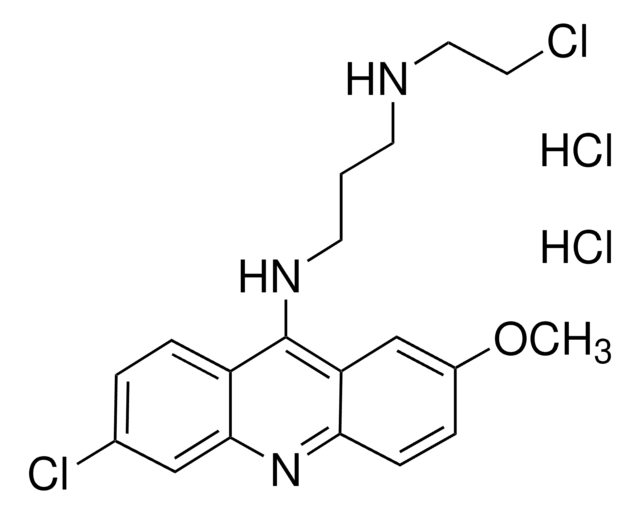Q3251
Quinacrine dihydrochloride
≥90% (TLC), powder, MAO-A/B inhibitor
Sinónimos:
6-Chloro-9-(4-diethylamino-1-methylbutylamino)-2-methoxyacridine dihydrochloride, Atebrin dihydrochloride, Mepacrine dihydrochloride
About This Item
Productos recomendados
product name
Quinacrine dihydrochloride, ≥90%
biological source
synthetic
Quality Level
assay
≥90%
form
powder
mp
257 °C
solubility
H2O: soluble, clear to hazy
originator
Bayer
SMILES string
Cl[H].Cl[H].CCN(CC)CCCC(C)Nc1c2ccc(Cl)cc2nc3ccc(OC)cc13
InChI
1S/C23H30ClN3O.2ClH/c1-5-27(6-2)13-7-8-16(3)25-23-19-11-9-17(24)14-22(19)26-21-12-10-18(28-4)15-20(21)23;;/h9-12,14-16H,5-8,13H2,1-4H3,(H,25,26);2*1H
InChI key
UDKVBVICMUEIKS-UHFFFAOYSA-N
Gene Information
human ... MAOA(4128) , MAOB(4129)
¿Está buscando productos similares? Visita Guía de comparación de productos
General description
Application
- in its uptake and accumulation studies in mouse lung slices using fluorescence microscope
- in the staining of ATP vesicles in mesenchymal stem cells (MSCs)
- in uptake-release assay for characterization of dense granule functionality of platelets
Biochem/physiol Actions
Features and Benefits
Storage and Stability
Other Notes
signalword
Warning
hcodes
Hazard Classifications
Acute Tox. 4 Oral
Storage Class
11 - Combustible Solids
wgk_germany
WGK 3
ppe
dust mask type N95 (US), Eyeshields, Gloves
Certificados de análisis (COA)
Busque Certificados de análisis (COA) introduciendo el número de lote del producto. Los números de lote se encuentran en la etiqueta del producto después de las palabras «Lot» o «Batch»
¿Ya tiene este producto?
Encuentre la documentación para los productos que ha comprado recientemente en la Biblioteca de documentos.
Los clientes también vieron
Nuestro equipo de científicos tiene experiencia en todas las áreas de investigación: Ciencias de la vida, Ciencia de los materiales, Síntesis química, Cromatografía, Analítica y muchas otras.
Póngase en contacto con el Servicio técnico









